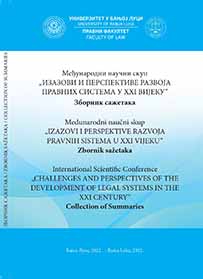GENDER INEQUALITY IN THE EUROPEAN LABOR MARKET IN THE 21ST CENTURY, FROM A PORTUGUESE PERSPECTIVE
GENDER INEQUALITY IN THE EUROPEAN LABOR MARKET IN THE 21ST CENTURY, FROM A PORTUGUESE PERSPECTIVE
Author(s): João Proença Xavier, Sandra Sofia Duarte LourençoSubject(s): Gender Studies, Law, Constitution, Jurisprudence, International Law, Human Rights and Humanitarian Law, Philosophy of Law, EU-Legislation, Labour and Social Security Law
Published by: Правни факултет Универзитета у Бањој Луци
Keywords: Equality; Woman; Professional; Covid-19;
Summary/Abstract: Objective: Analyze a systematic review of studies on the impact of Covid-19 on gender inequality, discussing the role of women in the labor market. Methodology: Bibliographic research of articles and documents in Portuguese and English obtained from various official and royalty-free websites, from December 10th to 23rd, 2020. Results: It is possible to see that gender inequality meets a set of requirements fundamental to determining a country’s wealth. Those countries where gender discrimination is prohibited are the richest ones. Examples are given of equal opportunities among men and women (50/50), both in the job market and family roles. Conclusion: It is statistically significant that the participation of women in various roles (professional, wife, mother, and educator) promotes social well-being and contributes to the economic and political stability of the countries. It is not enough to have laws and strategic plans to solve the crisis that ensued from the Covid-19 pandemic. Alternatives will have to be found, reinforcing institutional mechanisms to establish the effective integration of women in positions equal to men, without discrimination in wage, motivation, and productivity
Journal: Зборник радова Међународни научни скуп „Изазови и перспективе развоја правних система у XXI вијеку"
- Issue Year: 2022
- Issue No: 2
- Page Range: 113-123
- Page Count: 11
- Language: English

